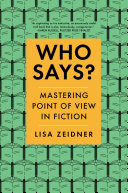
Who Says?
Mastering Point of View in Fiction
- اطلاعات
- نقد و بررسی
- دیدگاه کاربران
نقد و بررسی

December 15, 2020
A thorough, practical guide for writers focused on the problem of point of view. Via astute close readings of myriad literary examples, poet and novelist Zeidner argues persuasively that point-of-view decisions "are the very heart of fiction, more central and crucial than plot." After a chapter devoted to examining first lines and first paragraphs, Zeidner considers a variety of narrative possibilities: omniscience, third-person limited, first person, telling a story from the point of view of a child--sometimes reminiscing as a grown-up--or an animal, the effect of using you or we, and the difference in point of view in fiction vs. film. She offers helpful advice for revision and ends with exercises geared to each chapter. When writers select one point of view rather than another, Zeidner maintains, they determine their relationship to their subject and their characters: "whether you're moving toward your subject, or whether you're moving away. Whether you're going to encourage the reader to bathe in the character's view of the world, or offer a complementary or even competing one." Choosing a third-person point of view opens up "gradations with infinite possibilities," depending on the writer's "spectrum of closeness and distance from a character." Zeidner cites novels in which the narrative unfolds from several characters' views, a popular choice in contemporary fiction and one that creates a complex picture of the fictional world. She nods to the controversy over authenticity and appropriation, which she thinks largely depends on point of view. As much as she focuses on technique, Zeidner asserts that "a fiction writer's most important tool isn't technical. It's profound interest in other people." As a rich resource for further reading, the author includes hundreds of stories, novels, writing guides, and movies in her comprehensive list of Works Cited. An engaging and well-informed writing companion.
COPYRIGHT(2020) Kirkus Reviews, ALL RIGHTS RESERVED.

January 1, 2021
Too often, the difference between flat, beginner's fiction and effective, memorable storytelling is the writer's ability to choose the appropriate point of view. In this immensely readable guide, author and writing instructor Zeidner explains how to make POV decisions that produce the most compelling work. The book is aimed at emerging writers, but anyone who enjoys reading fiction will be fascinated by Zeidner's understanding of how narrative POV shapes the audience experience. Zeidner breaks down the appropriate uses and advantages of third person omniscient point of view, third person limited, first person, even the rare second person point of view, and gives examples of how both classic and contemporary authors have employed them successfully. The guide is not limited to the most straightforward adult POV options, as Zeidner also outlines children's and animals' points of view, and the use of found documents like diary entries or emails. The book concludes with a series of exercises for writers to interrogate their chosen POV and get the most emotional impact out of that perspective.
COPYRIGHT(2021) Booklist, ALL RIGHTS RESERVED.

April 5, 2021
Novelist Zeidner (Love Bombs) delivers an accessible guide to fiction writing in this welcome antidote to fusty academic didacticism. Zeidner argues that making decisions about narration in fiction is “critical,” and she dedicates a chapter to each point of view. She covers godlike omniscience (“the one we all know instinctively”); first person, which can sound the most “authentic”; second person and third person; and even child and animal points of view (wherein she warns against leaning into “faux-naïf”). Zeidner samples generously from the texts of such authors as Jane Austen, Charles Dickens, Marilynne Robinson, and Leo Tolstoy, and expertly explores such quandaries as “authorial presence,” or how much the author’s voice and the voices of their characters should merge. She also warns of the perils of trying to weave too many points of view in a single work of fiction, as doing so offers less space to develop characters. Zeidner writes in accessible and passionate prose, and exercises round things out and help put her advice to practical use. This is an indispensable supplement for any creative writing student.




دیدگاه کاربران